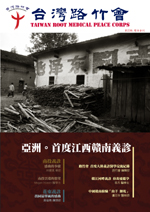
熱門標籤
Academic Research
Education and Training
Motorcade Transportation repairs
Accompany reading
Home Care
Wildlife And Nature Tree Planting
Central America Medical Action
africa Medical Action
Asia Medical Action
Fieldwork
Emergency Relief
Story List
Donate Materials
Medias
NGO NPO
Introduction Volunteering
Domestic Medical Missions
Visitors:1922
Page Viewed:14291972
Page Viewed:14291972
In the Mountains of Nantou
215th By Megan Hosein
Columbia University BA
A few feet away from me, a 7-year-old boy is quietly whimpering from pain and fear as the nurse injects novocaine into his gums, and prepares to pull out two baby teeth. I’m watching the nurses reassuringly hold his hands and tell him to be still, to be strong, as he shakes and tightly shuts his eyes. On my other side, a group of doctors are talking amongst themselves and bringing nurses over to look at their current patient. The tall, thin, middle-aged man sits awkwardly in a short wooden chair—usually used by kindergarten students in this classroom— and cradles his right arm close to his body. The doctors and nurses take turns feeling his shoulder, before staring at each other and talking in rushed whispers. One of the bilingual doctors soon explains to me in English that this man has come in with a dislocated shoulder causing limited range of motion in his right arm. This fairly common injury shouldn’t have had many long-term complications, but this man dislocated his shoulder months ago and it was never set back into place. Now, months later, new tendons and ligaments have grown over the permanently displaced joint, making it impossible to fix without surgery.
Why didn’t this man seek medical attention as soon as he dislocated his shoulder instead of letting it become a much more serious condition? Because he, like every other patient we’d seen that day, was part of a community living in the mountain region of Nantou, miles away from the nearest doctor or hospital.
The communities we visited in Nantou were not just poor, they were incredible isolated, living in towns high up in the mountains only reachable by a few roads that are in dangerously poor condition. On our short trip, we had to frequently change our itinerary and route because certain roads were inaccessible due to landslides or storm damage. I was in Nantou with the members of Taiwan Root Medical Peace Corps (TRMPC); a group whose mission is to bring doctors, nurses, and medicine to communities that otherwise go without medical attention. TRMPC, like other well-known organizations such as Doctors without Borders, sends groups of medical personnel on trips to developing nations and sites of natural disasters where medical care is scare and desperately needed.
However, TRMPC not only works on international crises, but also focuses on those communities in its own country that are excluded from access to necessary medical care. Taiwan is a rapidly advancing country with first class hospitals and medical universities training thousands of doctors, and yet there are still communities that can’t reach doctors and medication, communities that are often ignored and overlooked. The efforts of TRMPC are trying to change this.
I learned about the TRMPC through idealist.org, a website created to bring together individuals interested in a range of humanitarian work. Reading about TRMPC made me feel like this was a group of like-minded people doing the work I would one day like to do as a doctor, bringing medical care to those who have no means to access it. TMRPC was kind enough to invite me along on a recent trip to shadow some of the doctors and see how the organization works.
I was struck by how incredibly welcoming this group was. In our group of over 30 people, I realized that doctors made up just a small part of an effort like this. There were logisticians, drivers, chefs cooking delicious meals three times a day, and all of the volunteers helping the trip run smoothly. Everyone, no matter what background, had a role to play to work towards our goal of providing medical care to these communities. Two doctors were kind enough to let me shadow them, and were incredibly helpful in teaching me about their consultations and the background of their patients. They explained the major health risks of the communities, the benefits of Chinese and Western medicine consultations, and the limitations of their treatment of chronic conditions since TRMPC can only visit each community a few times a year.
This trip proved to me that in any country, there will always be marginalized and ignored groups who do not have access to medicine, and there will always be a need for more doctors. This experience will continue to inspire me as I pursue my medical studies, in the hope that one day I can join a group like this and put my medical skills to use for the people that need them the most. I can only hope that when that day comes, there will always be people like the members of TRMPC who will be willing to come together and work to meet this goal.


